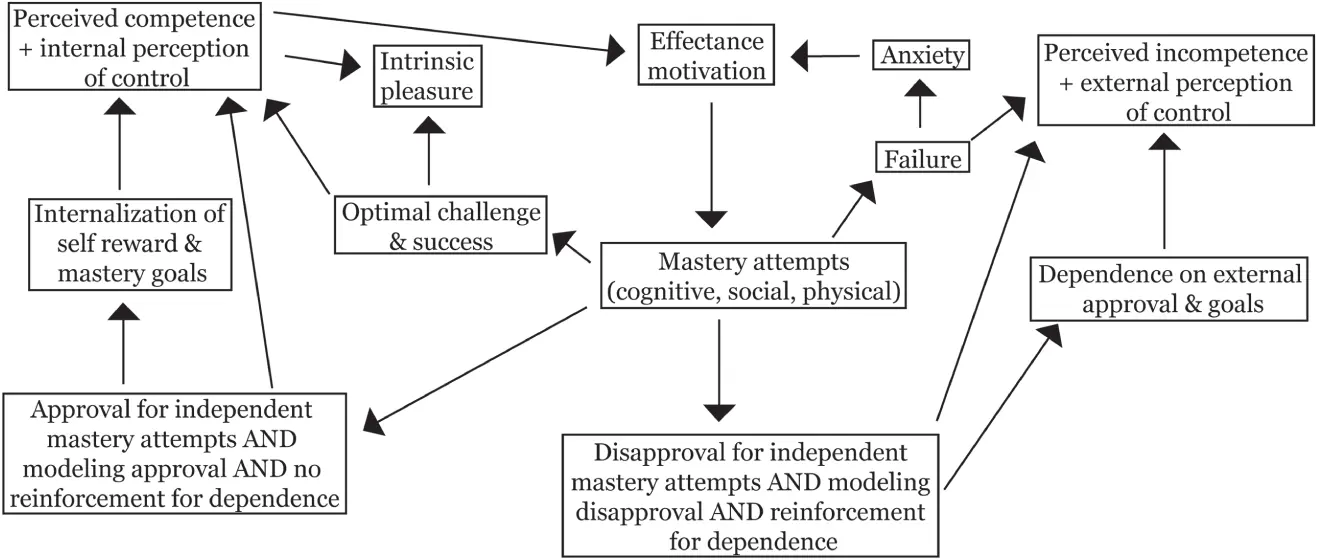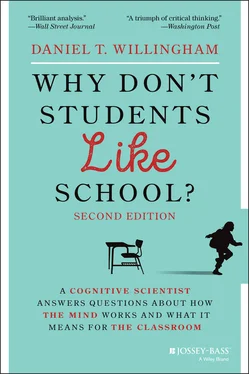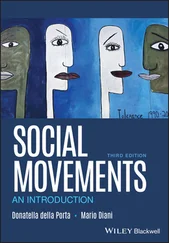The implications for education sound rather grim. If people are bad at thinking and try to avoid it, what does that say about students' attitudes toward school? Fortunately, the story doesn't end with people stubbornly refusing to think. Despite the fact that we're not that good at it, we actually like to think. We are naturally curious, and we look for opportunities to engage in certain types of thought. But because thinking is so hard, the conditions have to be right for this curiosity to thrive, or we quit thinking rather readily. The next section explains when we like to think and when we don't.
People Are Naturally Curious, But Curiosity Is Fragile
Even though the brain is not set up for very efficient thinking, people actually enjoy mental activity, at least in some circumstances. We have hobbies like solving crossword puzzles or scrutinizing maps. We watch information-packed documentaries. We pursue careers – such as teaching – that offer greater mental challenge than competing careers, even if the pay is lower. Not only are we willing to think, we intentionally seek out situations that demand thought.
Solving problems brings pleasure. When I say “problem solving” in this book, I mean any cognitive work that succeeds; it might be understanding a difficult passage of prose, planning a garden, or sizing up an investment opportunity. There is a sense of satisfaction, of fulfillment, in successful thinking. Neuroscientists have found overlap between the brain areas that are important in learning and those that are important in perception of pleasure, and many neuroscientists suspect that the two systems are related. Rats in a maze learn better when rewarded with cheese. When you solve a problem or satisfy your curiosity, your brain may reward itself with a small burst of a naturally occurring chemical in the brain's pleasure system. Even though the neurochemistry is not completely understood, it seems undeniable that people take pleasure in solving problems.
It's notable too that the pleasure is in the solving of the problem. Working on a problem with no sense that you're making progress is not pleasurable. In fact, it's frustrating. Then too, there's not great pleasure in simply knowing the answer. I told you the solution to the candle problem; did you get any fun out of it? Think how much more fun it would have been if you had solved it yourself – in fact, the problem would have seemed more clever, just as a joke that you get is funnier than a joke that has to be explained. Even if someone doesn't tell you the answer to a problem, once you've had too many hints you lose the sense that you've solved the problem, and getting the answer doesn't bring the same mental snap of satisfaction.
Mental work appeals to us because it offers the opportunity for that pleasant feeling when it succeeds. But not all types of thinking are equally attractive. People choose to work crossword puzzles but not algebra problems. A biography of Taylor Swift is more likely to sell well than a biography of Keats. What characterizes the mental activity that people enjoy ( Figure 1.5)?
The answer that most people would give may seem obvious: “I think crossword puzzles are fun and Taytay is cool, but math is boring and so is Keats.” In other words, it's the content that matters. We're curious about some stuff but not about other stuff. Certainly that's the way people describe our own interests – “I'm a stamp collector” or “I'm into medieval symphonic music.” But I don't think content drives interest. We've all attended a lecture or watched a video (perhaps only after being prevailed upon to do so) about a subject we thought we weren't interested in, only to find ourselves fascinated. And it's easy to find yourself bored even when you usually like the topic. I'll never forget my eagerness for the day my middle school teacher was to talk about sex. As a teenage boy in a staid 1970s suburban culture, I fizzed with anticipation of any talk about sex, anytime, anywhere. But when the big day came, my friends and I were bored senseless. It's not that the teacher talked about flowers and pollination – he really did talk about human sexuality – but somehow it was still dull. I actually wish I could remember how he did it; boring a bunch of hormonal teenagers with a sex talk is quite a feat.

FIGURE 1.5 : Why are many people fascinated by problems like the one shown on the left, but very few people willingly work on problems like the one on the right?
Source: Sudoku © Shutterstock/Heather Wallace; geometry © Anne Carlyle Lindsay.
I once made this point to a group of teachers when talking about motivation and cognition. About five minutes into the talk I presented a slide depicting the model of motivation shown in Figure 1.6. I didn't prepare the audience for the slide in any way; I just displayed it and started describing it. After about 15 seconds I stopped and said to the audience, “Anyone who is still listening to me, please raise your hand.” One person did. The other 59 were also attending voluntarily; it was a topic in which they were presumably interested, and the talk had only just started – but in 15 seconds their minds were somewhere else. To be clear, I'm not blaming them; the content of a problem – whether it's about sex or human motivation – may be sufficient to prompt your interest, but it won't maintain it.
So, if content is not enough to keep your attention, when does curiosity have staying power? The answer seems to lie in our judgment of how much we are likely to learn. Curiosity is maintained when we think we'll learn a lot.
That judgment – will I learn? – is closely related to our perception of the difficulty of the problem. If it's that little burst of pleasure from solving a problem that we look forward to, then there's no point in working on a problem that is too easy – there'll be no pleasure when it's solved because it didn't feel like much of a problem in the first place. Then too, when you size up a problem as very difficult, you are judging that you're unlikely to solve it, and are therefore unlikely to get the satisfaction that comes with the solution. A crossword puzzle that is too easy is just mindless work: you fill in the squares, scarcely thinking about it, and there's no gratification, even though you're getting all the answers. But you're unlikely to work long at a crossword puzzle that's too difficult. You know you'll solve very little of it, so it will just be frustrating. The slide in Figure 1.6is too detailed to be absorbed with minimal introduction; my audience quickly concluded that it was overwhelming and mentally checked out of my talk.

FIGURE 1.6 : A difficult-to-understand figure that will bore most people unless it is adequately introduced.
Source: © Anne Carlyle Lindsay.
To summarize, I've said that thinking is slow, effortful, and uncertain. Nevertheless, people like to think – or more properly, we like to think if we judge that the mental work will pay off with the pleasurable feeling we get when we learn something new. So there is no inconsistency in claiming that people avoid thought and in claiming that people are naturally curious – curiosity prompts people to explore new ideas and problems, but when we do, we quickly evaluate how much mental work it will take to solve the problem or understand what's described. If it's too much work or too little, we stop thinking about the problem if we can.
Читать дальше














